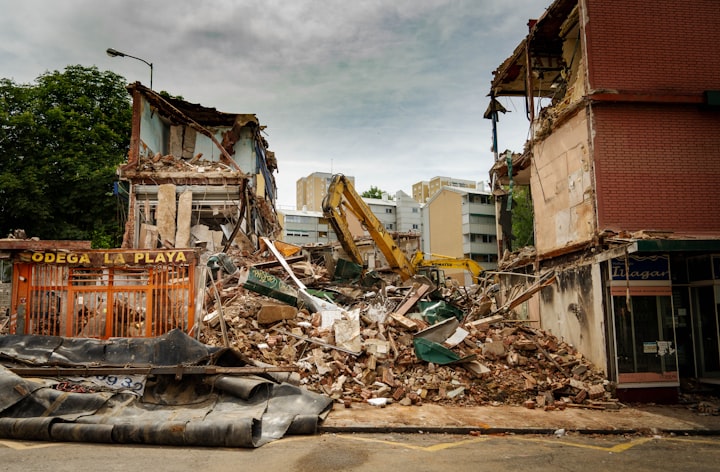Survive and Thrive: A Guide to Earthquake Preparedness
Easy Earthquake Survival Tips

Earthquakes are a natural and unpredictable occurrence that can devastate a community in minutes. Here are some tips to help you survive an earthquake.
1. Get to a safe place. If you are in the open, head for a low-lying area or a sturdy building. If you are in an enclosed space, try to find a corner or a space near the walls that is less likely to be damaged.
2. Stay calm. If you are panicked, you are more likely to do something that could put your safety at risk. Remain calm and assess the situation around you.
3. Listen to your instincts. If something feels wrong, it probably is. Follow your gut instinct and leave the area.
4. Evacuate if ordered to. If an earthquake has been confirmed, listen for instructions and evacuate. If there is no confirmation of an earthquake, stay put and wait for further instructions.
5. Avoid dangerous objects. If you are in an area with unstable structures or walls, stay away from them. Do not try to move objects that may be hazardous.
6. Be prepared for aftershocks. After an earthquake, there may be aftershocks that can be very strong. Be prepared to move to a safer place if an aftershock occurs.
7. Help others. If you can, help injured people and animals. If there is a fire, try to put it out. If you are able, try to provide medical assistance.
8. Stay calm and follow instructions. If there is an emergency, listen for instructions and do what you are told.
9. Be prepared for the aftermath. If an earthquake has occurred, be prepared for aftershocks, fires, and other disasters. Have an emergency plan and be ready to act quickly.
1. How to respond to an earthquake
Unfortunately, earthquakes are all too common, and they can cause a lot of damage. Here are some tips to help you survive an earthquake. If you're in an earthquake zone, it's important to know that you are in a danger zone.
Stay away from buildings that are in dangerous conditions. If you are in a building, stay in a concrete room or hallway. If you are outside, stay away from buildings that are in danger of collapsing. If you are driving, stay in your car and avoid bridges and highways.
2. What to do if you're trapped
If you're trapped after an earthquake, the best thing to do is to stay calm and assess the situation. If you're alone, try to find a way out. If there is someone else with you, try to get them out. If you're with others, try to stay together.
If you're trapped after an earthquake, the best thing to do is to stay calm and assess the situation. If you're alone, try to find a way out. If there is someone else with you, try to get them out. If you're with others, try to stay together.
If there is no way out, stay calm and protect yourself from potential injuries. Make yourself as small as possible and curl up in a ball. If you're not wearing clothes, cover yourself as best you can. If you're injured, don't move.
If you're in an area that's heavily damaged, don't try to go outside. The area may be unsafe and you may not be able to return. If you're in a heavily damaged area and can't leave, try to stay calm and conserve energy. If you need to evacuate, do so as quickly and calmly as possible.
3. How to find food and water
In the event of an earthquake, the most important thing to do is to locate food and water. This will help keep you safe and healthy.
If you are in an area that is prone to earthquakes, it is important to know the warning signs.
The US Geological Survey has a list of warning signs that you can look for to prepare for an earthquake:
-Loud roaring sound, like thunder
-Rocks falling from the sky
-Earthquake tremors that last for a long time
-Damage to buildings, roads, or bridges
-Lack of water or gas in areas
-People running in the streets
If you are in an area that is prone to earthquakes and you feel an earthquake shaking, the best thing to do is to stay indoors until the shaking stops.
If you are outside, stay close to a building or grab onto something sturdy. If you are in a car, drive to the nearest sturdy building.
If there is no sturdy building nearby, then try to hold onto a door or rail while the shaking lasts.
If you are outside and the shaking lasts for more than a few seconds, then you should try to find an open area and lie down on the ground.
If you are inside and the shaking lasts for more than a few seconds, then crawl under a sturdy piece of furniture.
4. How to make a fire
If an earthquake hits, the first thing you'll want to do is make a fire. You can either create a fire using natural materials or by using a lighter.
If you're using natural materials, the first thing you'll need is a piece of wood. You can either use a piece of dry wood or wet wood. If you're using wet wood, you'll need to soak it in water first.
Once you have the wood, you'll need to place it on the ground so that it's in a fire shape. Then, you'll need to add kindling. This is usually things like sticks, leaves, or branches.
Once you have the kindling, you'll need to add the wood. Make sure that the wood is in a cross shape and that the fire is big enough so that you can sit in it.
If you're using a lighter, you'll need to get some kindling first. Then, you'll need to light the lighter and hold it over the kindling. You'll need to do this in a slow and controlled manner so that the fire doesn't get out of control.
Once you have the fire started, you'll need to move away from it so that it doesn't get too hot. You can also use a water bottle to put water over the fire if it gets too hot.
5. How to protect yourself from the weather
Earthquake survivors know that when the shaking starts, the weather can quickly turn deadly. Here are a few tips to help you survive in extreme weather conditions:
-Pack a bag with essentials, such as water, food, a first-aid kit, and a flashlight.
-Stay in an area that is as low as possible to the ground. This will help to reduce the effects of shaking and make you less likely to be injured.
-Stay calm and follow instructions from emergency personnel.
-If you are in a building, stay in the lowest level and away from windows.
-If you are outside, find a sturdy building or stay in a group.
6. How to deal with panic
Panic is a natural response to an emergency. However, the best way to deal with panic is to understand what it is and how it works.
When you experience a panic attack, your body enters into a state of shock. This reaction is automatic and is meant to help you survive a dangerous or life-threatening event.
One of the ways your brain deals with this is to increase your breathing and heart rate. This will help you to get more oxygen and to pump more blood through your body.
Panic attacks can be very unpleasant, but they are not life-threatening. If you recognize the signs of a panic attack, you can take steps to prevent or reduce the symptoms.
If you experience a panic attack, the best thing to do is to take slow, deep breaths and to focus on a calming phrase or image.
Earthquakes are a natural disaster that can happen at any time, and they can be quite deadly. In order to survive an earthquake, it is important to be aware of the signs and know what to do in order to protect yourself and your loved ones. I hope that you will be able to take the necessary steps to survive an earthquake.
About the Creator
Radhakrishnan
I am a passionate and dedicated writer. I specialize in creating compelling content that is both engaging and informative.My writing skills include crafting blog posts, articles, website content, product reviews, and more.






Comments
There are no comments for this story
Be the first to respond and start the conversation.